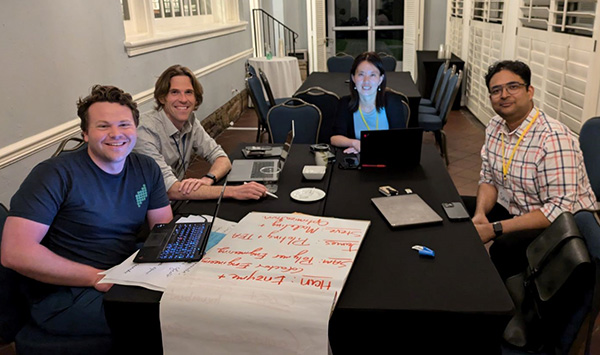NSF $7.5 Million Grant Supports Li’s Innovative Biomanufacturing Process

May 13, 2025 - Han Li, associate professor of chemical and biomolecular engineering, has received a $7.5 million award from the National Science Foundation’s Directorate for Technology, Innovation and Partnerships. The three-year grant will support Li’s development of a novel biomanufacturing process to make valuable organic pesticide chemicals in a more efficient, environmentally friendly and economical way.
Li proposes using a cell-free approach to biomanufacturing with custom-designed enzymes and innovative materials that help organize chemical reactions outside of a living cell, making the process easier to scale and more cost-effective. This could open the door to producing high-value products that support and enhance supply chain resilience. Specifically, her project enables the production of chiral chemicals, the essential building blocks of all major pesticides, which are currently manufactured in wasteful and polluting chemical processes.
Her project team includes three Co-PIs from both academia and industry (UCLA, University of Tennessee, Knoxville, and Cascade Biocatalysts). Li says they are honored and excited to work on this project. "It was honestly quite stunning to see how organically each team member's expertise meshed together,” she said. “With the seamless integration of fundamental research and commercialization efforts, this project will realize the real-world impacts of our technologies."
The project grew out of the NSF Ideas Lab that Li participated in last year. The workshop focused on accelerating the adoption of cell-free systems, to enable new applications of this technology and contribute to the growth of the U.S. bioeconomy. The NSF Advancing Cell-Free Systems Toward Increased Range of Use-Inspired Applications (CFIRE) initiative seeks to reduce the cost and increase the range of cell-free systems and develop and demonstrate their use. The workshop brought together 37 participants from industry and academia nationwide. They brainstormed ideas, formed collaborative teams and pitched their project concepts. Li’s team was subsequently invited by NSF to submit a full proposal, which was highly appraised by the CFIRE reviewers. “This team embodies the spirit of the Ideas Lab in that these teams might not have ever connected outside this environment,” wrote the proposal reviewers. “It is clear that the synergy across this team is strong and suitable for fulfilling the goals of the Ideas Lab and the CFIRE program."
– Lori Brandt
